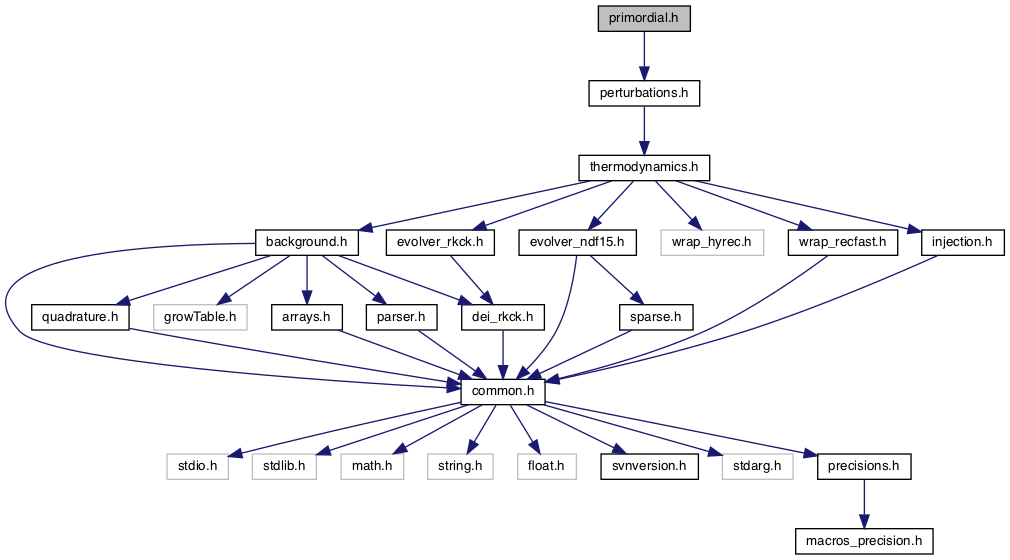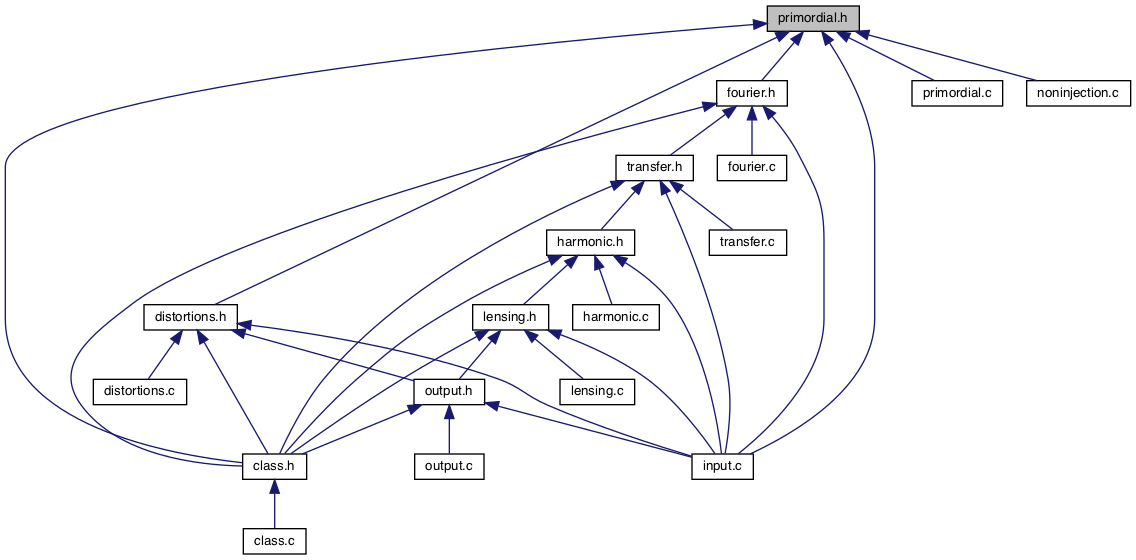#include "perturbations.h" Include dependency graph for primordial.h:
Include dependency graph for primordial.h: This graph shows which files directly or indirectly include this file:
This graph shows which files directly or indirectly include this file:Go to the source code of this file.
Data Structures | |
| struct | primordial |
Enumerations | |
| enum | primordial_spectrum_type |
| enum | linear_or_logarithmic |
| enum | potential_shape |
| enum | target_quantity |
| enum | integration_direction |
| enum | time_definition |
| enum | phi_pivot_methods |
| enum | inflation_module_behavior |
Detailed Description
Documented includes for primordial module.
Data Structure Documentation
◆ primordial
| struct primordial |
Structure containing everything about primordial spectra that other modules need to know.
Once initialized by primordial_init(), contains a table of all primordial spectra as a function of wavenumber, mode, and pair of initial conditions.
| Data Fields | ||
|---|---|---|
| double | k_pivot |
pivot scale in |
| int | has_k_max_for_primordial_pk | |
| double | k_max_for_primordial_pk |
maximum value of k in 1/Mpc in P(k) |
| enum primordial_spectrum_type | primordial_spec_type |
type of primordial spectrum (simple analytic from, integration of inflationary perturbations, etc.) |
| double | A_s |
usual scalar amplitude = curvature power spectrum at pivot scale |
| double | n_s |
usual scalar tilt = [curvature power spectrum tilt at pivot scale -1] |
| double | alpha_s |
usual scalar running |
| double | beta_s |
running of running |
| double | r |
usual tensor to scalar ratio of power spectra, |
| double | n_t |
usual tensor tilt = [GW power spectrum tilt at pivot scale] |
| double | alpha_t |
usual tensor running |
| double | f_bi |
baryon isocurvature (BI) entropy-to-curvature ratio |
| double | n_bi |
BI tilt |
| double | alpha_bi |
BI running |
| double | f_cdi |
CDM isocurvature (CDI) entropy-to-curvature ratio |
| double | n_cdi |
CDI tilt |
| double | alpha_cdi |
CDI running |
| double | f_nid |
neutrino density isocurvature (NID) entropy-to-curvature ratio |
| double | n_nid |
NID tilt |
| double | alpha_nid |
NID running |
| double | f_niv |
neutrino velocity isocurvature (NIV) entropy-to-curvature ratio |
| double | n_niv |
NIV tilt |
| double | alpha_niv |
NIV running |
| double | c_ad_bi |
ADxBI cross-correlation at pivot scale, from -1 to 1 |
| double | n_ad_bi |
ADxBI cross-correlation tilt |
| double | alpha_ad_bi |
ADxBI cross-correlation running |
| double | c_ad_cdi |
ADxCDI cross-correlation at pivot scale, from -1 to 1 |
| double | n_ad_cdi |
ADxCDI cross-correlation tilt |
| double | alpha_ad_cdi |
ADxCDI cross-correlation running |
| double | c_ad_nid |
ADxNID cross-correlation at pivot scale, from -1 to 1 |
| double | n_ad_nid |
ADxNID cross-correlation tilt |
| double | alpha_ad_nid |
ADxNID cross-correlation running |
| double | c_ad_niv |
ADxNIV cross-correlation at pivot scale, from -1 to 1 |
| double | n_ad_niv |
ADxNIV cross-correlation tilt |
| double | alpha_ad_niv |
ADxNIV cross-correlation running |
| double | c_bi_cdi |
BIxCDI cross-correlation at pivot scale, from -1 to 1 |
| double | n_bi_cdi |
BIxCDI cross-correlation tilt |
| double | alpha_bi_cdi |
BIxCDI cross-correlation running |
| double | c_bi_nid |
BIxNIV cross-correlation at pivot scale, from -1 to 1 |
| double | n_bi_nid |
BIxNIV cross-correlation tilt |
| double | alpha_bi_nid |
BIxNIV cross-correlation running |
| double | c_bi_niv |
BIxNIV cross-correlation at pivot scale, from -1 to 1 |
| double | n_bi_niv |
BIxNIV cross-correlation tilt |
| double | alpha_bi_niv |
BIxNIV cross-correlation running |
| double | c_cdi_nid |
CDIxNID cross-correlation at pivot scale, from -1 to 1 |
| double | n_cdi_nid |
CDIxNID cross-correlation tilt |
| double | alpha_cdi_nid |
CDIxNID cross-correlation running |
| double | c_cdi_niv |
CDIxNIV cross-correlation at pivot scale, from -1 to 1 |
| double | n_cdi_niv |
CDIxNIV cross-correlation tilt |
| double | alpha_cdi_niv |
CDIxNIV cross-correlation running |
| double | c_nid_niv |
NIDxNIV cross-correlation at pivot scale, from -1 to 1 |
| double | n_nid_niv |
NIDxNIV cross-correlation tilt |
| double | alpha_nid_niv |
NIDxNIV cross-correlation running |
| enum potential_shape | potential |
parameters describing the case primordial_spec_type = inflation_V |
| double | V0 |
one parameter of the function V(phi) |
| double | V1 |
one parameter of the function V(phi) |
| double | V2 |
one parameter of the function V(phi) |
| double | V3 |
one parameter of the function V(phi) |
| double | V4 |
one parameter of the function V(phi) |
| double | H0 |
one parameter of the function H(phi) |
| double | H1 |
one parameter of the function H(phi) |
| double | H2 |
one parameter of the function H(phi) |
| double | H3 |
one parameter of the function H(phi) |
| double | H4 |
one parameter of the function H(phi) |
| double | phi_end |
value of inflaton at the end of inflation |
| enum phi_pivot_methods | phi_pivot_method |
flag for method used to define and find the pivot scale |
| double | phi_pivot_target |
For each of the above methods, critical value to be reached between pivot and end of inflation (N_star, [aH]ratio, etc.) |
| enum inflation_module_behavior | behavior |
Specifies if the inflation module computes the primordial spectrum numerically (default) or analytically |
| char * | command |
'external_Pk' mode: command generating the table of Pk and custom parameters to be passed to it string with the command for calling 'external_Pk' |
| double | custom1 |
one parameter of the primordial computed in 'external_Pk' |
| double | custom2 |
one parameter of the primordial computed in 'external_Pk' |
| double | custom3 |
one parameter of the primordial computed in 'external_Pk' |
| double | custom4 |
one parameter of the primordial computed in 'external_Pk' |
| double | custom5 |
one parameter of the primordial computed in 'external_Pk' |
| double | custom6 |
one parameter of the primordial computed in 'external_Pk' |
| double | custom7 |
one parameter of the primordial computed in 'external_Pk' |
| double | custom8 |
one parameter of the primordial computed in 'external_Pk' |
| double | custom9 |
one parameter of the primordial computed in 'external_Pk' |
| double | custom10 |
one parameter of the primordial computed in 'external_Pk' |
| int | md_size |
number of modes included in computation |
| int * | ic_size |
for a given mode, ic_size[index_md] = number of initial conditions included in computation |
| int * | ic_ic_size |
number of ordered pairs of (index_ic1, index_ic2); this number is just N(N+1)/2 where N = ic_size[index_md] |
| int | lnk_size |
number of ln(k) values |
| double * | lnk |
list of ln(k) values lnk[index_k] |
| double ** | lnpk |
depends on indices index_md, index_ic1, index_ic2, index_k as: lnpk[index_md][index_k*ppm->ic_ic_size[index_md]+index_ic1_ic2] where index_ic1_ic2 labels ordered pairs (index_ic1, index_ic2) (since the primordial spectrum is symmetric in (index_ic1, index_ic2)).
|
| double ** | ddlnpk |
second derivative of above array, for spline interpolation. So:
|
| short ** | is_non_zero |
is_non_zero[index_md][index_ic1_ic2] set to false if pair (index_ic1, index_ic2) is uncorrelated (ensures more precision and saves time with respect to the option of simply setting P(k)_(index_ic1, index_ic2) to zero) |
| double ** | amplitude |
all amplitudes in matrix form: amplitude[index_md][index_ic1_ic2] |
| double ** | tilt |
all tilts in matrix form: tilt[index_md][index_ic1_ic2] |
| double ** | running |
all runnings in matrix form: running[index_md][index_ic1_ic2] |
| int | index_in_a |
scale factor |
| int | index_in_phi |
inflaton vev |
| int | index_in_dphi |
its time derivative |
| int | index_in_ksi_re |
Mukhanov variable (real part) |
| int | index_in_ksi_im |
Mukhanov variable (imaginary part) |
| int | index_in_dksi_re |
Mukhanov variable (real part, time derivative) |
| int | index_in_dksi_im |
Mukhanov variable (imaginary part, time derivative) |
| int | index_in_ah_re |
tensor perturbation (real part) |
| int | index_in_ah_im |
tensor perturbation (imaginary part) |
| int | index_in_dah_re |
tensor perturbation (real part, time derivative) |
| int | index_in_dah_im |
tensor perturbation (imaginary part, time derivative) |
| int | in_bg_size |
size of vector of background quantities only |
| int | in_size |
full size of vector |
| double | phi_pivot |
in inflationary module, value of phi_pivot (set to 0 for inflation_V, inflation_H; found by code for inflation_V_end) |
| double | phi_min |
in inflationary module, value of phi when |
| double | phi_max |
in inflationary module, value of phi when |
| double | phi_stop |
in inflationary module, value of phi at the end of inflation |
| short | primordial_verbose |
flag regulating the amount of information sent to standard output (none if set to zero) |
| ErrorMsg | error_message |
zone for writing error messages |
Enumeration Type Documentation
◆ primordial_spectrum_type
enum defining how the primordial spectrum should be computed
◆ linear_or_logarithmic
enum defining whether the spectrum routine works with linear or logarithmic input/output
◆ potential_shape
| enum potential_shape |
enum defining the type of inflation potential function V(phi)
◆ target_quantity
| enum target_quantity |
enum defining which quantity plays the role of a target for evolving inflationary equations
◆ integration_direction
enum specifying if we want to integrate equations forward or backward in time
◆ time_definition
| enum time_definition |
enum specifying if we want to evolve quantities with conformal or proper time
◆ phi_pivot_methods
| enum phi_pivot_methods |
enum specifying how, in the inflation_V_end case, the value of phi_pivot should calculated
◆ inflation_module_behavior
enum specifying how the inflation module computes the primordial spectrum (default: numerical)

